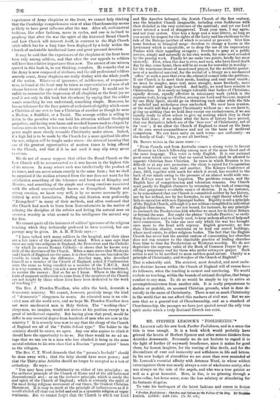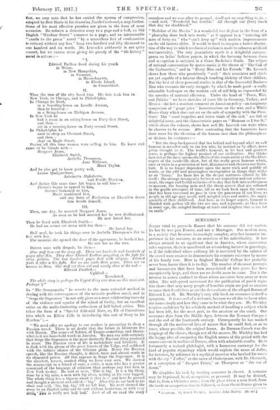MR. STEPHEN LEACOCK'S " FOOLISHNESS."*
LEACOCE calls his new book Further Foolishness, and in a sense the title is true enough. It is a book which would probably have grieved the hearts of Herbert Spencer and other serious thinkers from Aristides downwards. Personally wo do not hesitate to regard it in the light of further (if wayward) beneficence, since it makes for good cheer, for honest laughter, for the routing of blue devils, and for the discomfiture of cant and insincerity and selfishness in life ana letters. In his new budget of absurdities we are more than ever reminded of Mr. Leacock's essential affinity with Artemus Ward, in whose wildest extravagances there was nearly always a core of wholesome sanity, who was always on the side of the angels, and who was a true patriot as well as a great humorist. Here, in fine, is no grinning through a horse-collar, but horse-sense, none the less- salutary or stimulating for its fantastic disguise.
To take his burlesques of the latest fashions and crazes in fiction
• Further Foolfrhnen Midden and Natirot on Mt Ponta of 1he-Day. Br 301416 Leacock, London: John Lane. Ps. Cd. first,. we. may note that he has carried the system of compression, adopted by Bret F.arte in his Sensation Novas Condensed, a step further. Some of his most effective parodies are given in the form of mere scenarios. He reduces a detective story to a page and a half, an Old English " Wardour Street" romance to a page; and an interminable "cradle to the grave " novel " by a marvellous feat of condensation is reduced without any loss " from two hundred and fifty thousand to one hundred and six words. Mr. Leacoek's arithmetic is not quite correct, but wo cannot resist giving his parody of the "life-history" novel in velum
I. "
Edward Endless lived during his youth in Maine, in New Hampshire, in Vermont, in :Massachusetts, in Rhode Island, iu Connecticut.
Then the lure of the city lured him. His fate took him to New York, to Chicago, and to Philadelphia. In Chicago ho lived, in a boarding-houso on Lasalle Avenue,
then he boarded—
in a living-house on Michigan Avenue. In New York lie had a room -in an eating-house on Forty-first Street,
and then—
ate in a rooming-house on Forty-second Street.
In -Philadelphia he
used to sleep on Chestnut Street, and then-- slept on Maple Street. During all this time women were calling to him. He knew and
came to be friends with—
Margaret Jones, Elizabeth Smith, Arabella Thompson, Jane Williams, Maud Taylor. And he also got to know pretty well, Louise Queleueehose, Antoinette Alphabette, and Estelle Etcetera.
Ana_ during this same time Art began to call him—
Pictures began to appeal to him, Statues beekoned to him, Music maddened him, and any form of Recitation or Elocution drove him beside himself.
Iii.
Then, one day, he married Margaret Jones. As soon as he had married her he was disillusioned.
Ho now hated her.
Then he lived with Elizabeth Smith—
lie had no sooner sat down with her than- . He hated her.
Half mad, he took his things over to Arabella Thompson's flat to live with her.
The moment she opened the door of the apartment, he loathed her. Ho saw her as she was.
Driven sane with despair, he then—
(Our staff here cut the story off. There are hundreds and hundreds of pages after this. They show Edward Endless grappling in the fight for clean politics. The last hundred pages deal with religion. Edward
finds it after a big fight. Bat no one reads these pages. There are no women in them. Our staff cut them out and merely show at the end—
Edward Purified- Uplif ted- Transluted.
The whole story is perhaps the biggest thing erer done on this continent.
Perhaps I)"
Lt " The Snoopopaths " he reverts to the more extended method in dealing with the extravagances of the neurotic problem novel, and in
Serge the Superman " he not only gives us a most exhilarating travesty of the violence and squalor of the school of Gorky, but an excellent satire on the undiscriminating enthusiasm of half-baked critics. This takes the form of a "Special Editorial Note, or, Fit of Convulsions into which an Editor Falls in introducing this sort of Story to his Headers"
" We need offer no apology to our readers in presenting to them a Russian novel. There is no doubt that the future in literature lies with Russia. The names of Tolstoi, of Turgan-something, and Hostel- what-is-it are household words in America. We may say with certainty that Serge the 'Superman is the most distinctly Russian thing produced in years. The Russian view of life is melancholy and fatalistic. It is dark with the gloom of the great forests of the Volga, and saddened with the infinite silence of the Siberian plain. Hence the Russian speech, like the Russian thought, is direct, tease and almost crude in its elemental power. All this appears in Serge the Superman. It is the dircctest, tersest, crudest thing we have ever seen. We showed the manuscript to a friend of ours, a critic, a man who has a greater command of the language of criticism than perhaps any two men in New York to-day. He said at once, ` This is big. It is a big thing, done by a big man, a man with big ideas, writing at his very biggest. The whole thing has a bigness about it that is—' and hero he paused and thought a moment and added= big.' After this he sat back in his chair and said, ' big, big, big,' till we left him. We next showed the story to an English critic and he said. without hesitation, or with very This is really not half bad.' Last of all we read the story
ourselves and wo rose after its perusal—itself not an easy thing to do-- -and said, ` Wonderful but terrible.' All through our (free) lunch that day we shuddered."
" Madeline of the Movies " is a wonderful tour de force in the form of a " photoplay -done back into words " as it appears to a " tottering old man of forty-six" who "can't keep up" with modern improvements on the old lantern-slides. It would be hard to.imagine a better illustra- tion of the way in which mechanical realism is made to subserve artificial sentimentality. The only journalistic squib is .a delightful extrava- ganza on ladies' fashion papers, in which the harmony between dress and occupation is satirized in a Grass Bachelor's Guide. The eclipse of rational conversation by motor-mania is the theme of " The Call of the Carburettor," and in " Every Man and his Friends " Mr. Leacoek shows how those who persistently " crab " their associates and chief are yet capable of a fatuous though touching idolatry of their children. But the best of these personal studies is that of the Successful Business Man who recounts the early struggles by which he made good—a really admirable burlesque on the modern cult of sell-help as expounded by the apostles of material efficiency. Under the head of "Peace, War, and Politics " we have sketches of inner life in Germany, Turkey, and Mexico—the last a mordant comment on American policy—an imaginary symposium of "grape juice" humanitarians on the war, and a White House diary which does not err on the side of sympathy with the Presi- dent.* The "cruel tragedies and bitter trials of tho rich" are full of delightful irony, and the characteristic paper on " Humour as I See It," which closes the volume, shows how well Mr. Leacock can write when he chooses to be serious. After contending that the humorists have done more for the elevation of the human race than the philosophers or divines, he continues :- " But the deep background that lies behind and beyond what we call humour is revealed only to the few who, by instinct or by effort, have given thought to it. The world's humour, in its best and greatest sense, is perhaps the highest product of our civilization. One thinks here not of the mere spasmodic effects of the comic artist or the black-face expert of the vaudeville show, but of the really great humour which, once or twice in a generation at best, illuminates and elevates our litera- ture. It is no longer dependent upon the mere trick and quibble of words, or the odd and meaningless incongruities in things that strike us as funny.' Its basis lies in the deeper contrasts offered by life itself : the strange incongruity between our aspiration and our achieve. ment, the eager and fretful anxieties of to-day that fade into nothingness to-morrow, the burning pain and the sharp sorrow that are softened in the gentle retrospect of time, till as we look back upon the course that has been traversed we pass in view the panorama of our lives, as people in old age may recall, with mingled tears and smiles, the angry quarrels of their childhood. And here, in its larger aspect, humour is blended with pathos till the two are one, and represent, as they have in every age, the mingled heritage of tears and laughter that is our lot on earth."



































 Previous page
Previous page